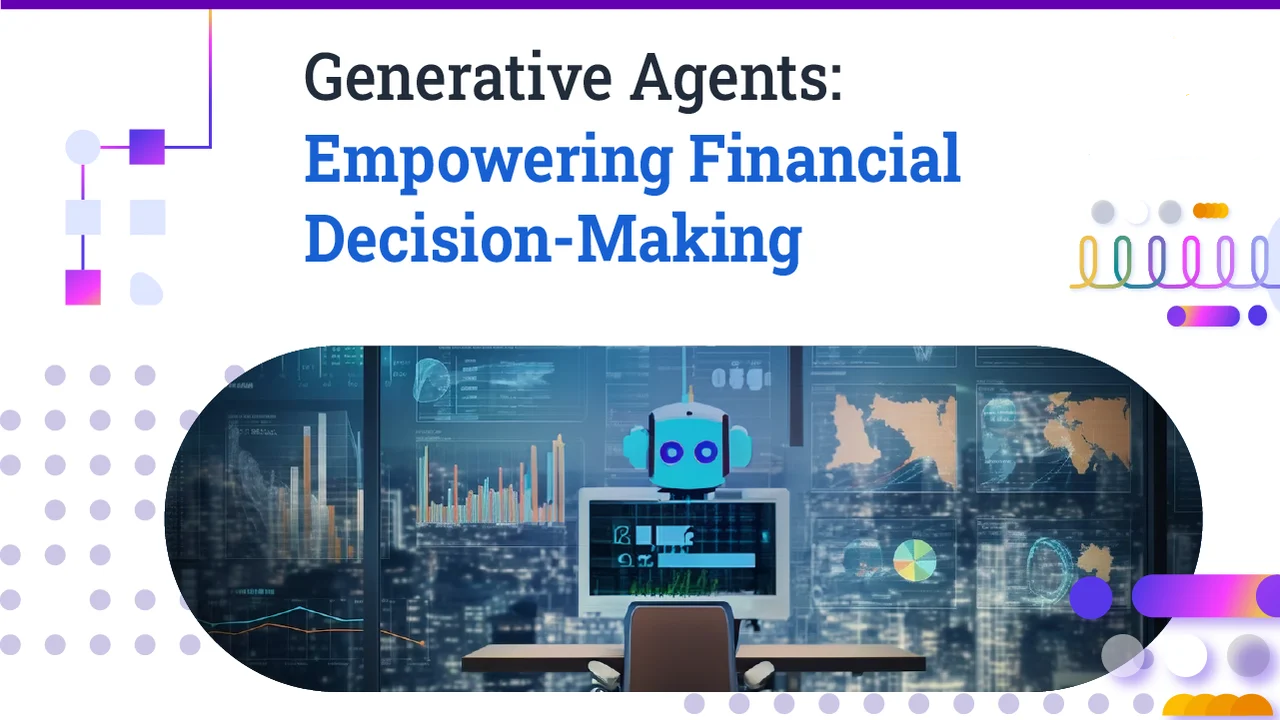What are Generative Agents
Generative AI Agents are used with the help of large language models (LLMs) and retrieval-augmented generation (RAG) with data of organization, it enables querying on organizations fragmented Knowledge bases. With the help of Generative AI Agents, the end customers will be able to get up-to-date information through a chat interface through voice or text. They can act directly on it. In the context of Generative AI, the term “agents” typically refers to the systems or entities that generate added content, data, or outputs based on learned patterns and structures from existing examples. These agents can be several types of algorithms or models that can generate new instances of data that are like or inspired by the training data. Generative AI agents have the potential to revolutionize operations and processes across a wide range of industries.
How Generative AI Can Help Financial Analysts
Typical Day-to-day activities of a Financial Analyst involve analyzing financial data, preparing reports, and providing insights and recommendations to support decision-making within an organization. Financial Analysts play a important role in analyzing financial data, interpreting trends, and providing strategic guidance to support informed decision-making and drive financial performance within organizations. Financial Analysts typically work in various industries, including banking, investment firms, corporate finance, and consulting. With the rise of Generative AI, many of these roles and responsibilities are going to be impacted by Generative AI Agents. Generative AI is going to bring a lot of productivity in many of the key functions of Financial Analysts. Some of the key areas, where Generative AI is going to play a key role are the following: –
- Financial Planning and Forecasting: Preparing Budgets, Forecasts to predict future revenues, cashflows, expenses.
- Financial Reporting: Providing insights to organizations related to income statements, balance sheets, etc.
- Performance Analysis: Analyzing financial results and KPIs to find the effectiveness of business operations.
- Investment Analysis: Identify trends, variances, and areas of improvement to optimize performance and achieve financial goals.
- Conduct research, perform financial modeling, and assess risk-return profiles to make informed investment decisions.
- Risk Management: Analyze risk factors, perform stress testing, and recommend risk management measures to protect the organization’s financial assets.
- Financial Strategy Development: Analyze risk factors, perform stress testing, and recommend risk management measures to protect the organization’s financial assets.
- Offer financial insights and counsel to facilitate strategic decision-making and resource allocation.
- Mergers and Acquisitions (M&A) Analysis: Assess the financial impact of potential acquisitions or mergers and provide recommendations to stakeholders.
- Cost Analysis and Management: Analyze cost structures, pricing strategies, and profitability drivers to identify opportunities for cost optimization and efficiency improvements. Track costs, monitor budget variances, and implement cost-saving initiatives to enhance profitability.
- Regulatory Compliance: Stay updated on regulatory changes, conduct internal audits, and assist in preparing regulatory filings and disclosures.
- Communication and Stakeholder Engagement: communicate financial insights and recommendations to stakeholders, including senior management, investors, and external auditors. Financial analysts compile presentations, reports, and summaries to communicate intricate financial details effectively and succinctly.
Generative AI Agents In Financial Reporting
Automated Financial Report Generation
The integration of Generative AI enables the automation of financial report generation, producing textual summaries, charts, and tables from raw financial data. This automation markedly decreases the time and effort needed for report preparation, freeing financial analysts to concentrate on higher-value tasks. As a result, financial analysts will transition from primarily creating reports to assuming a more reviewer-oriented role. This use case signals a substantial transformation in the responsibilities of financial analysts.
Financial Data Explainer
Generative AI can add Natural Language Generation techniques that can transform structured financial data into human-readable summaries. It would bring capabilities for a layperson to understand complex Financial Reports and Data in simple language. For example, Generative AI algorithms can generate explanations for variances, trends, and key performance indicators (KPIs) in financial reports, providing stakeholders with clear and actionable insights.
Customized Report Generation
It’s a misconception that Generative AI works only on a fixed set of Automated reporting. Generative AI can generate customized financial reports tailored to the specific needs and preferences of different stakeholders. By analyzing user input and preferences, Generative AI algorithms can generate reports with relevant content, formatting, and level of detail, improving the relevance and usefulness of the information presented.
Simulation & Scenario Modeling
Financial Analysts’ job function requires scenario modelling, which involves presenting multiple variations of reports to decision makers. Generative AI agents can facilitate ad hoc analysis and scenario modeling by generating multiple versions of financial reports based on different assumptions, parameters, and scenarios. This empowers financial analysts to delve into different hypothetical situations and evaluate their potential effects on financial performance and results.
Automation leads to Less Errors
If Generative AI agents are adopted by Financial Agents, it can can help improve the quality and accuracy of financial reports by detecting errors, inconsistencies, and anomalies in the underlying data. Through analysis of financial data’s patterns and trends, Generative AI algorithms can identify potential issues and alert financial analysts to take corrective actions.
AI-based Forecasting
Generative AI agents can incorporate predictive analytics and forecasting capabilities into financial reporting processes. It enables organizations to anticipate future trends, risks, and opportunities. By generating forecasts and predictive models based on historical data, Generative AI algorithms can help stakeholders make informed decisions and strategic plans.
Conclusion
Agents in the Generative AI for Finance domain refer to the components or systems within generative models that are responsible for generating new data instances based on learned patterns and structures from existing examples. Generative agents can revolutionize financial reporting by automating routine tasks, enhancing data analysis and interpretation, and enabling more informed decision-making and strategic planning. By leveraging the capabilities of Generative AI Agents, enterprises have the potential to improve the efficiency, accuracy, and effectiveness of their financial reporting processes.



